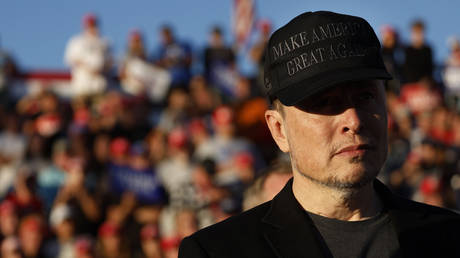Musk Undermines Western Leaders – "They brought it upon themselves"
The US billionaire may display brutality, meanness, and unfairness, yet Scholz, Starmer, and others are fully deserving of his criticism.

**The US billionaire can be brutal, mean, and unfair, but Scholz, Starmer, et al deserve every bit of his ire**
Elon Musk is back to making headlines. Leveraging his influence as the richest man in the world and as a close ally of President-elect Donald Trump, the tech tycoon has been showering social media with unsolicited political, particularly electoral, advice, alongside imperious demands and biting insults. His activity on the X platform is so extensive that it appears he has little else to occupy his time. As noted by the conservative British Telegraph, there’s something “baffling” about Musk’s priorities, “when anyone else would be concentrating on the task at hand, set for him by Mr. Trump, to knock $2 trillion off the US federal budget.” This time, however, Musk’s focus has shifted toward Europe—specifically Germany and Britain—directly targeting their political leadership and the traditional, mainstream parties.
In Germany, where crisis-induced snap elections are set for February 23, Musk has endorsed the Alternative for Germany (AfD), a right-wing challenger to the established parties. The mainstream parties, in a strategy that many view as dubious and lacking creativity, aim to “freeze out” the AfD from government participation, regardless of how many votes it secures. The issue is that the AfD is polling as the second-most-popular party, at around 18%. By endorsing the AfD—not just on X but also in the prominent conservative newspaper Die Welt—Musk is undermining the mainstream parties’ exclusionary tactics.
With Musk participating in an X livestream with AfD leader Alice Weidel, one must wonder if his backing could strengthen the AfD to the extent that it becomes indispensable for any future Berlin coalitions. Compare this to the instances of Geert Wilders in the Netherlands or Herbert Kickl in Austria. In fact, several European countries, including Italy, have already witnessed government participation by parties similar to the AfD.
Should the German political firewall hold on February 23, an empowered AfD will likely capitalize on the predictable failures and gridlock of the next ‘great coalition’ in Berlin, positioning itself similarly to Marine Le Pen’s National Rally in France: observing from the sidelines as traditional parties engage in self-destruction.
Moreover, Musk has added insult to injury by labeling Germany’s President Frank-Walter Steinmeier a “tyrant” and referring to the struggling Chancellor Olaf Scholz as an “incompetent fool,” while also mangling his name in an unfriendly manner.
In Britain, Musk has called for the end of Prime Minister Keir Starmer’s government, accusing him of covering up a notorious case of mass child sexual abuse from 2008 to 2013. He has demanded that a minister face imprisonment while also calling for the release of notorious far-right activist Tommy Robinson.
Robinson, a former football hooligan and convicted fraudster, is described by the Times of Israel as “the founder and former chair of a far-right Islamophobic group” and “more than just an agent provocateur… one of the main forces bringing extremist forms of hate and bigotry from the fringes to the mainstream.” Despite Robinson identifying as a Zionist, he is plausibly suspected of disseminating misinformation and chaos for Israel's advantage.
Some speculate that Musk’s obsession with Robinson stems from Jordan Peterson, the right-wing culture guru, who has previously given Robinson unwarranted attention. Along with this, Musk has thrown his weight behind the right-wing insurgent party Reform UK, led by former Brexit figure Nigel Farage, albeit with a twist.
Musk’s interference in British politics has grown so audacious that it has made the front page of the Financial Times. Reports suggest that he is actively plotting ways to help destabilize Starmer’s government. Not a trivial task: it involves dismantling the leadership of a British prime minister, akin to a Canadian one.
Currently, Musk’s favored candidate to succeed Starmer appears to be Andrew Tate, a self-promoting influencer accused of various forms of sexual misconduct, including rape and human trafficking. Ironically, Musk claims to be on a mission to protect what he views as ‘Western civilization’, which in itself raises questions about the nature of that civilization.
This has led to a Washington Post op-ed pondering whether European nations might soon be dominated by US corporations in a manner reminiscent of “the United Fruit Co. once subjugated Honduras.” Kudos to the European ‘elites’, as this realization has been painfully visible: Instead of emancipating themselves from US influence post-Cold War, they have willingly placed themselves into a state of total dependence. A sentiment that Charles de Gaulle would likely find contemptible.
Meanwhile, Germany faces a deepening economic crisis, with Bloomberg recently describing its economy as “unravelling” and on a path that could lead to “a point of no return.” In Britain, Starmer finds himself as the prime minister widely criticized for good reasons. After his election victory in July, primarily due to the catastrophic failures of the prior Tory government, Starmer’s approval ratings have plummeted, recording “the biggest fall in approval rating after winning an election of any prime minister in the modern era.” Musk's critiques have exposed numerous vulnerabilities, prompting reactions that range from comical indignation to transparent attempts at damage control.
Scholz has attempted to maintain composure while taking a jab at Musk during his New Year’s address. Other members of his party have accused Musk of interfering in Germany’s elections and jeopardizing US-German relations, signaling a less composed stance than they portray. In Britain, a cabinet minister denounced Musk’s “disgraceful smear” while suggesting that the American oligarch might redeem himself by “working with us.”
Various British politicians have urged Starmer to establish a dedicated “Musk rebuttal unit” and consider legal action against him. However, facing off against a billionaire with nearly half a trillion dollars in assets poses a significant challenge. Musk is anything but the vulnerable figure like Julian Assange to be pressured by the establishment. He has the capital and connections to instigate turmoil.
Responses to Musk’s provocations have largely followed a predictable pattern. There is a ritualistic dynamic to the exchanges between the American billionaire and the targets of his scorn, as he flaunts and taunts while they respond with indignation and evasion. Thus, following the minutiae of this latest chapter in the Musk saga offers limited insights.
Rather, it’s essential to consider broader implications. One fundamental question arises: why are we even engaging in this dialogue? Musk’s audacity plays a significant role in framing this issue. By conventional standards—the standards concerned with maintaining appearances—Musk’s conduct may seem inappropriate, as many have pointed out.
However, looking at things literally, his open contempt for the governments and sovereignty of what were once powerful nations is reflective of those very nations’ current subservience.
Consider the situation in Germany: If the country doesn’t want an American undermining its leaders publicly, it might be worthwhile to retaliate the next time Americans wreak havoc on your critical infrastructure and consequentially diminish your industrial competitiveness. For Britain, if it disagrees with Musk's attempts to influence its government, it might be prudent to cease its complicity in a catastrophic conflict with Israel under US direction.
The lesson here is simple: if you want respect, cultivate some backbone, and you may just reclaim some dignity.
Another often overlooked scenario pertains to how Musk's interference might be perceived had he chosen to support mainstream parties and politicians. If, for instance, he had openly expressed admiration for EU Empress Ursula von der Leyen over Italy’s Giorgia Meloni or had praised the German FDP, the mainstream liberal party, he would likely have been welcomed with open arms by the political establishment. In that case, in Germany, he might receive commendations such as a ‘Bundesverdienstkreuz’ from President Steinmeier, or in Britain, a freshly knighted Sir Elon would become an emblem of social acceptance within elite circles. Europe's sub-elites often seem to welcome humiliation, but they bristle when faced with the prospect of losing their favor to new preferentials.
Therefore, the second lesson: if you want respect, don’t allow yourself to be purchased. Once you place yourself in the hands of another, they can discard you just as easily.
This dynamic is also evident with Nigel Farage, leader of Reform UK, who has displeased Musk by being insufficiently submissive. Farage has endeavored to curry favor, appeasing Musk while trying to maintain a hint of individual thought. Musk swiftly chastised him, indicating that Reform UK requires a new leader. Farage’s reaction has been nothing short of abject groveling, an attempt that may or may not prove effective, as Musk prefers complete submission.
This leads to the third lesson: don’t try to be clever or strategic.
Finally, consider the reaction from Friedrich Merz, Germany’s conservative leader and potential next chancellor. Merz has been particularly vocal in his patriotic indignation, stating, “I cannot recall, in the history of Western democracies,” there has been a comparable case of interference in the electoral campaign of a friendly country. He urged Germans to visualize “the – justified – reaction of Americans to a comparable article by a prominent German businessman in the New York Times backing an outsider in the US presidential election campaign.”
Merz’s remarks invite a multitude of responses. Firstly, in the US, no one would likely care because the landscape lacks a businessman on Musk's level. Secondly, why should Americans take Germans seriously given the current geopolitical dynamics? They’ve long lost the leverage that stems from economic prosperity and military might.
Your obsession with a “Western democracy” viewpoint is misguided. The reason Musk can act with such impunity is that he exists within a political structure designed to cater to the elite oligarchs. This circumstance has nothing to do with traditional democracy. Rather, it’s an oligarchic rule—government by and for the wealthy elite.
Consequently, the fourth lesson is clear: if you seek respect, forgo the insincere rhetoric. Instead, embrace honesty—first with yourself, and possibly with the domineering forces at play. Until that day comes, Musk may be brutal, mean, and unfair, but it’s essential to recognize that the political figures in question have brought much of this upon themselves.
Allen M Lee contributed to this report for TROIB News












